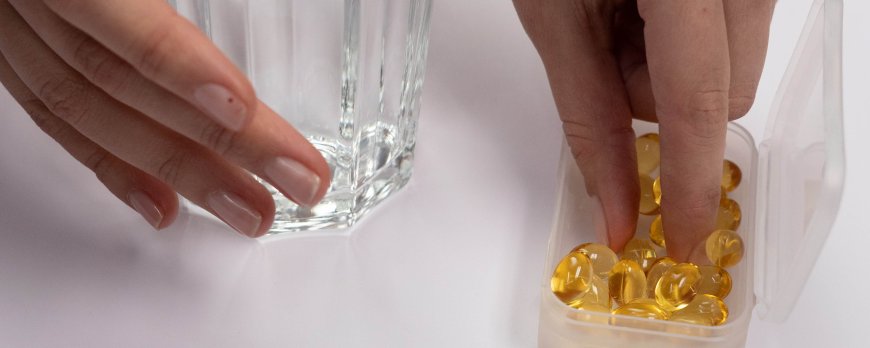Is vitamin D3 hard on your kidneys?
Explore the link between vitamin D3 and kidney health. Is vitamin D3 hard on your kidneys? Uncover the facts and protect your wellbeing.

Is Vitamin D3 Hard on Your Kidneys?
Many people wonder whether taking vitamin D3 supplements can have adverse effects on their kidneys. It is important to understand the relationship between vitamin D3 and kidney health to make informed decisions about supplementation.
Vitamin D3 plays a crucial role in maintaining overall health, including the health of our kidneys. The kidneys are responsible for converting vitamin D into its active form, which helps regulate calcium and phosphorus levels in the body. Adequate vitamin D levels are essential for maintaining proper kidney function.
However, chronic kidney disease can lead to low vitamin D levels due to impaired kidney function. This can create a deficiency that may require supplementation under medical supervision. It is important to consult with a healthcare professional before starting any supplementation regimen, especially for individuals with existing kidney conditions.
On the other hand, excessive intake of vitamin D3 supplements can be detrimental to kidney health. Large doses of vitamin D, especially in patients with normal vitamin D levels, can cause kidney damage and even kidney failure. It is crucial to monitor vitamin D levels and avoid excessive supplementation to protect kidney health.
If you are considering taking vitamin D3 supplements, it is essential to be aware of the potential symptoms of vitamin D3 overdose. These may include fatigue, high blood pressure, frequent urination, confusion, and itchiness. If you experience any of these symptoms, it is important to consult with a healthcare professional promptly.
Key Takeaways:
- Vitamin D3 is important for maintaining kidney health.
- Chronic kidney disease can lead to low vitamin D levels.
- Excessive intake of vitamin D3 supplements can be harmful to the kidneys.
- Proper monitoring of vitamin D levels and consulting with a healthcare professional is crucial.
- Be aware of the potential symptoms of vitamin D3 overdose.
Understanding Kidney Function and Vitamin D3
The kidneys play a crucial role in converting vitamin D into its active form, which is essential for various bodily functions. This conversion process begins when the skin absorbs sunlight, triggering the synthesis of vitamin D3. However, the body cannot utilize vitamin D3 directly. Instead, it must be converted into its active form, known as calcitriol, by the kidneys. Calcitriol helps regulate calcium and phosphorus levels, promoting healthy bone growth and ensuring proper muscle and nerve function.
To carry out this conversion, the kidneys rely on a specific enzyme called 25-hydroxyvitamin D-1-alpha-hydroxylase. This enzyme, produced by the cells in the kidneys, converts vitamin D3 (also known as cholecalciferol) into its active form. Proper kidney function, therefore, is essential for maintaining adequate levels of active vitamin D in the body.
Importance of Renal Function for Vitamin D Metabolism
In addition to converting vitamin D into its active form, the kidneys also play a vital role in maintaining vitamin D levels. They help regulate the balance between absorption, excretion, and reabsorption of calcium and phosphorus, which are essential minerals for bone health and many physiological processes.
When kidney function is impaired or compromised, such as in cases of chronic kidney disease, the production and activation of vitamin D may be significantly reduced. This can lead to low vitamin D levels in the body, which can have far-reaching effects on overall health. Therefore, it is crucial for individuals with kidney conditions to monitor their vitamin D levels regularly and work closely with healthcare professionals to manage their renal function and vitamin D metabolism.
In conclusion, the kidneys are vital for converting vitamin D into its active form and maintaining optimal vitamin D levels in the body. Proper kidney function is essential for this conversion process and plays a significant role in overall bone health and various physiological functions. Individuals with kidney conditions should prioritize regular monitoring of their vitamin D levels and consult with healthcare professionals for appropriate management strategies.

Vitamin D3 Deficiency and Kidney Health
Patients with chronic kidney disease often experience low levels of vitamin D due to impaired kidney function. The kidneys play a vital role in converting vitamin D into its active form, which is necessary for maintaining bone health and supporting overall well-being. When kidney function is compromised, the production of active vitamin D decreases, leading to low vitamin D levels.
In addition to impaired kidney function, other factors can contribute to vitamin D deficiency in individuals with kidney disease. These include decreased exposure to sunlight, dietary restrictions, and the use of certain medications that can interfere with vitamin D metabolism.
Symptoms of Vitamin D3 Deficiency in Kidney Disease
Low levels of vitamin D can have significant implications for kidney health. Studies have shown that vitamin D deficiency in patients with chronic kidney disease is associated with an increased risk of cardiovascular disease, bone disorders, and muscle weakness. It may also contribute to the progression of kidney disease itself.
- Fatigue
- Muscle pain and weakness
- High blood pressure
- Increased risk of fractures and bone loss
It is essential for individuals with kidney disease to monitor their vitamin D levels regularly and work closely with healthcare professionals to ensure adequate supplementation. This will help prevent further complications, optimize kidney health, and improve overall well-being.
The Risks of Excessive Vitamin D3 Intake
Consuming excessive amounts of vitamin D3 through supplementation can pose risks to kidney health. While vitamin D is crucial for various bodily functions, including bone health and immune system support, it is important to maintain a balance in its intake.
One of the potential risks of excessive vitamin D3 intake is kidney damage. The kidneys play a vital role in converting vitamin D to its active form, which is necessary for its proper functioning in the body. However, when too much vitamin D3 is consumed, it can overwhelm the kidneys' ability to regulate and process it effectively, leading to kidney damage and even kidney failure.
It is important to note that the risks are more pronounced in individuals with normal vitamin D levels. For those with already compromised kidney function or chronic kidney disease, the potential for harm increases significantly. Monitoring vitamin D levels and seeking guidance from a healthcare professional before starting any vitamin D3 supplementation is crucial to avoid potential kidney damage.
Signs of vitamin D3 overdosing on the kidneys can include symptoms such as fatigue, high blood pressure, frequent urination, confusion, and itchiness. If any of these symptoms are experienced, it is important to consult with a healthcare professional immediately to assess kidney function and make any necessary adjustments to vitamin D supplementation.
To protect kidney health, it is recommended to adhere to the recommended dosage of vitamin D3 and consult with a healthcare professional before starting any supplementation regimen, especially for individuals with existing kidney conditions. Proper monitoring of vitamin D levels and regular check-ups can help ensure that the kidneys are not being overloaded with excessive amounts of vitamin D3, thereby safeguarding kidney health in the long run.
Symptoms of Vitamin D3 Overdosing on Kidneys
Symptoms of vitamin D3 overdose can include fatigue, high blood pressure, frequent urination, confusion, and itchiness. It is essential to be aware of these signs as they can indicate potential harm to kidney health.
Fatigue is a common symptom of vitamin D3 overdose on the kidneys. If you feel excessively tired or lack energy, it may be a signal that your kidneys are being strained by high levels of vitamin D3. Monitoring your energy levels and seeking medical advice if fatigue persists is crucial for maintaining kidney health.
High blood pressure is another symptom that may indicate vitamin D3 overdose on the kidneys. Increased blood pressure can put extra strain on your kidneys, potentially leading to kidney damage. Regular monitoring of blood pressure and consulting with a healthcare professional about the possibility of vitamin D3 overdose is essential for safeguarding your kidney health.
Frequent urination is also associated with vitamin D3 overdose on the kidneys. If you find yourself needing to urinate more frequently than usual, it could be a sign of kidney stress. Pay attention to changes in your urinary habits and discuss any concerns with a healthcare professional to ensure optimal kidney health.
Confusion and itchiness can also be symptoms of vitamin D3 overdose on the kidneys. These symptoms may be indicative of kidney dysfunction caused by excessive vitamin D3 intake. If you experience confusion or itching, it is important to seek medical advice promptly to evaluate your kidney health and take appropriate measures.

Importance of Proper Monitoring and Medical Supervision
Proper monitoring of vitamin D levels and consultation with a healthcare professional is crucial to prevent potential kidney damage. Vitamin D3 plays a vital role in maintaining overall health, including kidney health. However, excessive intake of vitamin D supplements without medical guidance can have adverse effects on the kidneys.
Individuals with normal vitamin D levels who consume large doses of vitamin D3 may experience kidney damage, and in severe cases, even kidney failure. It is important to note that toxicity from vitamin D overdosing can manifest through symptoms such as fatigue, high blood pressure, frequent urination, confusion, and itchiness.
By regularly monitoring vitamin D levels and seeking guidance from a healthcare professional, individuals can ensure that they are maintaining optimal kidney health. Medical supervision is particularly important for individuals with existing kidney conditions, as they may require specialized monitoring and adjustments to their vitamin D supplementation regimen.
To protect kidney health, it is imperative to follow the recommended daily intake of vitamin D3 as provided by healthcare professionals. Additionally, individuals should consider holistic strategies for maintaining kidney health, such as adopting a balanced diet, staying hydrated, engaging in regular physical activity, and avoiding smoking and excessive alcohol consumption.
Summary:
- Proper monitoring of vitamin D levels and consultation with a healthcare professional is crucial to prevent potential kidney damage.
- Excessive intake of vitamin D3 supplements without medical guidance can lead to kidney damage and even kidney failure.
- Regular monitoring and medical supervision are particularly important for individuals with existing kidney conditions.
- Adhering to recommended daily intake, adopting a balanced lifestyle, and maintaining overall health are essential for protecting kidney health.
Kidney Health Protection Strategies
There are several measures you can take to protect your kidneys while supplementing with vitamin D3. By following these strategies, you can ensure optimal renal health:
- Maintain proper hydration: Staying hydrated is essential for kidney function. Drink an adequate amount of water throughout the day to help flush out toxins and support overall kidney health.
- Monitor your vitamin D levels: Regularly check your vitamin D levels to ensure they stay within the recommended range. This will help prevent excessive intake and potential kidney damage.
- Consult with a healthcare professional: Before starting any supplementation, it is of utmost importance to seek guidance from a healthcare professional, especially if you have existing kidney conditions.
- Follow proper dosage guidelines: Stick to the recommended dosage of vitamin D3 as suggested by your healthcare provider. Avoid self-medicating or exceeding the recommended limits.
- Monitor kidney function: Regularly monitor your kidney function through blood tests and check-ups. This will help detect any potential issues early on and allow for prompt intervention.
Remember, protecting your kidney health is crucial when supplementing with vitamin D3. By implementing these strategies and working closely with your healthcare team, you can ensure the optimal functioning of your kidneys and maintain overall renal health.

Recommended Vitamin D3 Intake and Kidney Health
Understanding the proper dosage of vitamin D3 and its impact on kidney health is essential for informed supplementation. Vitamin D, often referred to as the "sunshine vitamin," is crucial for maintaining optimal kidney function and overall health. It plays a vital role in calcium absorption, bone health, and immune system function. However, excessive intake of vitamin D3 can have detrimental effects on the kidneys, especially in individuals with pre-existing kidney conditions.
It is recommended that adults aged 19 to 70 years consume 600 IU (International Units) of vitamin D per day. For individuals over 70 years old, the recommended intake increases to 800 IU per day. However, these values may vary depending on the individual's specific needs and health conditions. For those with kidney disease or impaired renal function, it is crucial to consult with a healthcare professional for personalized recommendations.
The Benefits of Proper Vitamin D3 Dosage
- Supports kidney function: Adequate vitamin D levels help optimize kidney function by enhancing the absorption of calcium and phosphorus, two essential minerals for maintaining bone health.
- Protects against kidney disease: Research suggests that proper vitamin D supplementation may help reduce the risk of developing kidney diseases, such as chronic kidney disease and kidney stones.
- Boosts immune system: Vitamin D plays a crucial role in regulating the immune system and reducing inflammation, which can indirectly benefit kidney health as well.
- Promotes overall well-being: By ensuring optimal levels of vitamin D, individuals can support their overall health, including kidney function.
While vitamin D3 can be beneficial for kidney health, it is essential to avoid excessive intake. Taking extremely high doses of vitamin D3, such as those well above the recommended daily intake, can lead to vitamin D toxicity, also known as hypervitaminosis D. This condition can cause kidney damage and even kidney failure. Symptoms of vitamin D overdose include fatigue, high blood pressure, frequent urination, confusion, and itchiness.
To protect kidney health, it is vital to monitor vitamin D levels regularly and consult with a healthcare professional before starting any supplementation regimen, especially for individuals with existing kidney conditions. A healthcare professional will be able to provide personalized guidance on the appropriate dosage of vitamin D3 and monitor its impact on kidney health.
Consulting with a Healthcare Professional
It is crucial to consult with a healthcare professional before initiating vitamin D supplementation, particularly if you have any existing kidney issues. Your doctor will be able to assess your kidney health and determine the appropriate dosage and frequency of vitamin D supplementation for your specific needs. This is especially important because excessive intake of vitamin D supplements can potentially cause kidney damage and adversely affect renal function.
Key Points:
- Schedule an appointment with your healthcare professional to discuss your kidney health and the possibility of incorporating vitamin D supplements into your routine.
- Inform your doctor about any existing kidney conditions or concerns you may have, as this will help them provide personalized guidance and recommendations.
- Your healthcare professional will conduct necessary tests and evaluations to ensure that your kidney function is optimal before starting vitamin D supplementation.
- Following their advice and guidance will help minimize the risk of potential kidney damage associated with excessive vitamin D intake.
Remember, your healthcare professional is the best resource for determining the appropriate course of action for your kidney health. By consulting with them, you can ensure that your vitamin D supplementation is safe and tailored to your individual needs.

Maintaining Kidney Health Holistically
In addition to proper vitamin D3 supplementation, adopting a holistic approach to kidney health is essential. Taking care of your kidneys involves making lifestyle choices that support their overall function and well-being. By incorporating these strategies into your daily routine, you can help promote healthy kidney function and reduce the risk of kidney-related complications.
1. Stay Hydrated:
- Drink an adequate amount of water throughout the day to ensure proper hydration.
- Hydration helps flush out toxins and waste products from the kidneys.
- Strive for at least 8 glasses of water per day, or more if needed.
2. Follow a Balanced Diet:
- Eat a nutrient-rich diet that includes plenty of fruits, vegetables, and whole grains.
- Avoid excessive intake of processed foods, sodium, and sugary drinks.
- Limit the consumption of red meat and opt for lean protein sources like fish and poultry.
3. Manage Blood Pressure and Blood Sugar Levels:
- Control your blood pressure and blood sugar levels by following a healthy lifestyle and taking any prescribed medications.
- High blood pressure and diabetes are common causes of kidney disease.
- Regular check-ups with your healthcare provider are important to monitor these conditions.
4. Avoid Smoking and Limit Alcohol Consumption:
- Smoking can damage blood vessels and decrease blood flow to the kidneys.
- Excessive alcohol consumption can lead to kidney damage and other health issues.
- Quitting smoking and moderating alcohol intake can help protect your kidneys.
By adopting these holistic practices, you can support kidney health and minimize the risk of complications. However, it's crucial to remember that consulting with a healthcare professional is essential for personalized advice and guidance based on your specific health needs.
Conclusion
Taking care of your kidney health while supplementing with vitamin D3 is crucial for overall well-being.
Vitamin D3, when used excessively or without medical supervision, can potentially be hard on the kidneys. The kidneys play a key role in converting vitamin D into its active form, and chronic kidney disease can lead to low vitamin D levels. Therefore, proper monitoring of vitamin D levels and consulting with a healthcare professional before taking any supplements is crucial to prevent kidney damage.
Excessive intake of vitamin D supplements, especially at large doses in patients with normal vitamin D levels, can cause kidney damage and even kidney failure. It is important to be aware of the potential risks and symptoms associated with vitamin D3 overdose, such as fatigue, high blood pressure, frequent urination, confusion, and itchiness. By maintaining the recommended daily intake of vitamin D3 and seeking medical advice, you can protect your kidneys and ensure their optimal functioning.
Remember, your kidney health is a vital component of your overall well-being. By adopting healthy lifestyle habits, such as regular exercise, a balanced diet, and staying hydrated, you can further support your kidney health. Prioritizing your kidney health and seeking proper medical guidance will enable you to reap the benefits of vitamin D3 supplementation while safeguarding your kidneys.































































































































